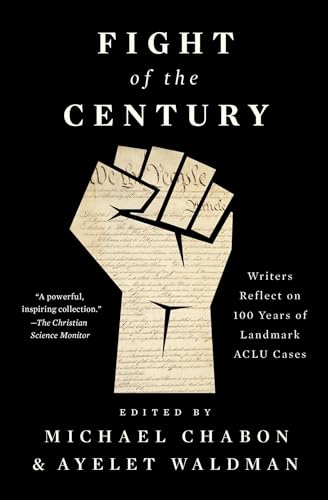Synopsis
The American Civil Liberties Union partners with award-winning authors Michael Chabon and Ayelet Waldman in this “forceful, beautifully written” (Associated Press) collection that brings together many of our greatest living writers, each contributing an original piece inspired by a historic ACLU case.
On January 19, 1920, a small group of idealists and visionaries, including Helen Keller, Jane Addams, Roger Baldwin, and Crystal Eastman, founded the American Civil Liberties Union. A century after its creation, the ACLU remains the nation’s premier defender of the rights and freedoms guaranteed by the Constitution.
In collaboration with the ACLU, authors Michael Chabon and Ayelet Waldman have curated an anthology of essays “full of struggle, emotion, fear, resilience, hope, and triumph” (Los Angeles Review of Books) about landmark cases in the organization’s one-hundred-year history. Fight of the Century takes you inside the trials and the stories that have shaped modern life. Some of the most prominent cases that the ACLU has been involved in—Brown v. Board of Education, Roe v. Wade, Miranda v. Arizona—need little introduction. Others you may never even have heard of, yet their outcomes quietly defined the world we live in now. Familiar or little-known, each case springs to vivid life in the hands of the acclaimed writers who dive into the history, narrate their personal experiences, and debate the questions at the heart of each issue.
Hector Tobar introduces us to Ernesto Miranda, the felon whose wrongful conviction inspired the now-iconic Miranda rights—which the police would later read to the man suspected of killing him. Yaa Gyasi confronts the legacy of Brown v. Board of Education, in which the ACLU submitted a friend of- the-court brief questioning why a nation that has sent men to the moon still has public schools so unequal that they may as well be on different planets. True to the ACLU’s spirit of principled dissent, Scott Turow offers a blistering critique of the ACLU’s stance on campaign finance.
These powerful stories, along with essays from Neil Gaiman, Meg Wolitzer, Salman Rushdie, Ann Patchett, Viet Thanh Nguyen, Louise Erdrich, George Saunders, and many more, remind us that the issues the ACLU has engaged over the past one hundred years remain as vital as ever today, and that we can never take our liberties for granted.
Chabon and Waldman are donating their advance to the ACLU and the contributors are forgoing payment.
About the Authors
David Handler began his career as a journalist and critic. He won widespread critical acclaim for his autobiographical first novel, KIDDO, and has gone on to win an Edgar and an American Mystery Award for his series of eight novels featuring the dapper amateur sleuth Stewart Hoag. Handler has written many television and film scripts with his longtime partner Peter Gethers. He lives in Old Lyme, Connecticut.
Sergio de la Pava is the author of Lost Empress, Personae, and A Naked Singularity, for which he won the 2013 PEN/Robert W. Bingham Award for debut fiction. He lives in New York City.
Created by front view screen
Meg Wolitzer's novels include The Wife, The Position, The Ten-Year Nap, The Uncoupling and The Interestings. The Interestings, published in August last year, was a New York Times bestseller and compared to the likes of Jonathan Franzen's Freedom and Jeffrey Eugenides' The Marriage Plot. Visit her at megwolitzer.com or follow her on Twitter at @MegWolitzer.
Elizabeth Strout's tenure as a lawyer (six months) was slightly longer than her career as a stand-up comedian (one night). She has also worked as a bartender, waitress and piano player at bars across the USA. She now teaches literature in New York, where she lives with her husband and daughter.
"About this title" may belong to another edition of this title.
